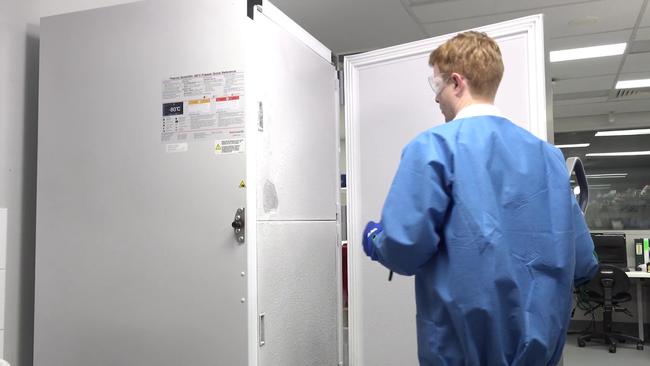COVID-19: Pfizer vaccine to be stored at warmer temperatures
New data from Pfizer shows its vaccine can now be stored at standard freezer temperatures instead of in ultra-cold conditions.

The federal government has no plans to change its vaccine rollout despite new data from Pfizer that shows its vaccine can now be stored at standard freezer temperatures instead of in ultra-cold conditions.
Changes to the front-running vaccine could drastically speed up its rollout, opening up the possibility that smaller pharmacies and doctor’s clinics could administer the shots using existing refrigerators or freezers.
The US Food and Drug Administration is expected to announce new guidelines after Pzifer submitted a request to allow administrators to store the protein-based vaccine between -25C to -15C for up to two weeks.
It was only previously approved for distribution if it was kept between -80C and -60 degrees, shipped in specially designed containers used as temporary storage for up to 30 days and refilled with dry ice every five days.
The vaccine’s original requirement of freezing storage temperatures has created complex logistical challenges, as the ultra-cold storage needs meant its distribution was considerably more expensive, with potential for batches to become damaged if there were refrigeration issues.
There were also issues when planning its rollout to remote communities. At present the plan is for remote Indigenous communities to get the AstraZeneca vaccine – which does not have cold storage requirements – in late March.
Curtin University supply chain management expert Dr Elizabeth Jackson says an increase in the storage temperature of the Pfizer vaccine would make the rollout more efficient.
“These changes would be very, very welcomed,” Dr Jackson said. “A short supply chain is an efficient supply chain. Increasing the storage temperatures will reduce the cost of the rollout, minimise the waste but also ensure the health of the people receiving the vaccine.”
“We see this a lot in humanitarian logistics. When things are sent to places where there have been natural disasters, and the electricity goes out, all the medication needs to be thrown out. There can be a lot of waste.”
“The vaccine at the moment is extremely precious. At the moment we’re still trying to keep up with demand. We need to get this medication out to more people, more quickly.”
Dr Jackson flagged that this must be done only on the proviso that the vaccine’s efficacy is not compromised.
The TGA said it has not yet received an application from Pfizer Australia to extend the vaccine’s shelf-life or change its storage conditions.
“Although in regular contact with Pfizer, we have not received an application to extend the shelf-life or change in storage conditions of the COVID-19 vaccine,” a TGA spokesperson said.
“Provisional registration is granted for the vaccine with the post-approval commitment by Pfizer, to submit additional stability data as it becomes available.
When asked if the federal government has any plans to change the rollout, a spokesperson said: “The Commonwealth is working with state and territory governments and logistics experts to ensure cold chain and vaccine supply across Australia, including rural and remote locations”.



To join the conversation, please log in. Don't have an account? Register
Join the conversation, you are commenting as Logout